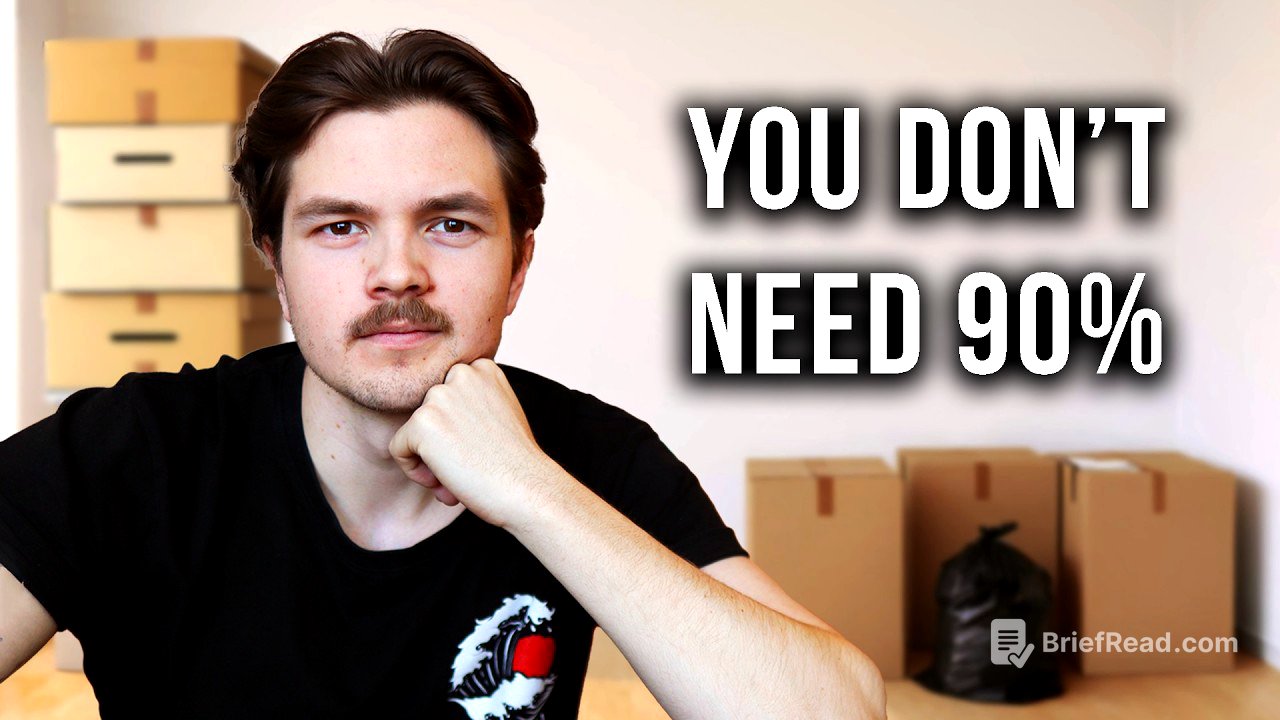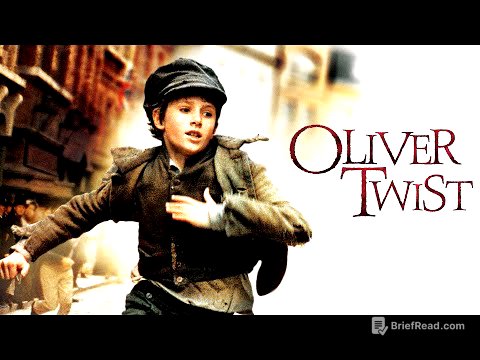TLDR;
This video explores how homes often become cluttered storage spaces, the reasons behind this, and the negative impact it has on our lives. It advocates for shifting our mindset from storing things to creating living spaces that support our well-being. The video also touches on the social challenges of minimalism and offers guidance on navigating these issues.
- Clutter accumulates due to laziness disguised as efficiency, the illusion of safety through possessions, and inherited items.
- Clutter leads to increased financial burdens, wasted time and energy, and emotional stagnation.
- A home should be a living space that promotes calm, energy, and connection, not just a storage unit.
- Overcoming clutter requires action and addressing the social pressures that contribute to it.
When homes lose their purpose [0:00]
Many homes are filled with unopened boxes, overflowing closets, and garages packed with untouched items, losing their original purpose as living spaces. The speaker, drawing from eight years of minimalism and decluttering, aims to address this issue. The goal is to explain why homes become dumping grounds, the consequences of this, and how to shift towards a healthier way of viewing our living spaces.
What minimalism has given me [0:30]
The speaker shares their personal experience of how minimalism and decluttering have positively transformed their living spaces. These spaces now feel lighter, are easier to manage, and better support daily life. This personal journey motivates the speaker to share insights on reclaiming homes as functional and supportive environments.
How clutter builds over time [1:03]
Homes rarely become cluttered intentionally. Instead, it happens gradually due to human reasons that seem logical but keep us stuck. One reason is laziness disguised as efficiency, where decisions are postponed by putting things away for later. These small choices accumulate, rendering rooms unusable.
The shortcut that costs you later [1:33]
The act of putting items in a spare room to avoid making immediate decisions feels like a time-saver in the moment. However, this is just postponing the decision, leading to a build-up of items. This accumulation eventually transforms rooms into unusable spaces, highlighting how these small, seemingly efficient choices can lead to significant clutter.
The comfort of keeping more [2:00]
Another reason for clutter is the belief that possessions equal safety. In the face of life's uncertainties, having more items around can create a sense of protection. This leads to keeping duplicates and "just in case" items, fostering a feeling of preparedness.
The lie hidden in bigger homes [2:36]
Bigger homes are marketed as better because they offer more space to live and store possessions. A full closet or packed garage is often seen as a sign of success and stability. However, the promised safety and status are illusions, leaving you feeling more stressed rather than safer.
The emotional pain of letting go [3:28]
Objects often serve as anchors for our identity, or who we once were. Letting go of these items feels like erasing a part of ourselves. This is related to loss aversion, where the pain of losing something is felt more strongly than the relief of gaining space, causing us to hold on to items even when it doesn't support our lives.
The trap of “might be useful” [4:18]
Items are often kept because they could be useful, not because they are. This "I might need it one day" mentality is a trap rooted in misplaced optimism. We overestimate how often we'll use something, keeping items that hold potential value but never truly serve our lives.
No mess doesn’t equal clutter-free [5:00]
Clutter isn't always obvious like mess, which comes and goes. Clutter builds slowly over time, often unnoticed, hiding in drawers, cupboards, basements, or even neatly organised spare rooms filled with unneeded items. Just because it's out of sight doesn't mean it isn't creating background stress.
The costs that build over time [6:00]
Allowing storage thinking to dominate reshapes your life. The first cost is space itself. Every box kept takes away from the potential of that room, preventing it from becoming a guest room, studio, or a calm space.
How clutter pushes you toward bigger bills [6:40]
Clutter leads to the feeling of needing a bigger home, pushing people towards renting storage units, buying larger houses, or investing in extra furniture and storage systems. However, the real need is less clutter, not more space.
Your stuff steals your time and energy [7:22]
Even if you can afford the extra space, clutter costs you time. You might spend hours moving clutter, shifting piles, or searching through boxes. Moving houses turns into a draining project as you transport all the accumulated items.
Clutter keeps you from the future [7:55]
Clutter carries a heavy mental load, with each stored object representing an unfinished decision. These decisions, often tied to the past, prevent you from living in the present. Your home becomes a reflection of who you were, making it harder to step into the future with clarity.
A home should hold life, not things [8:47]
A home should hold life, offering protection, rest, and human connection. Historically, homes were small, and people lived with less. Modern homes with extra closets, attics, basements, and garages are a recent development, fueling a multi-billion dollar self-storage industry.
Spaces designed for living again [9:50]
A living space should evoke calm, not guilt, and provide energy, not drain it. A simpler home is about function, with rooms serving a clear purpose instead of just storing stuff. Storage is useful when it supports life, but balance is lost when it replaces living.
Shift your mindset [10:30]
The mindset needs to shift from "how can I store this?" to "do I even need to keep this?". When your home is set up for living, not storing, it creates more space, possibility, and clarity. The potential of a home lies in being a living space that holds your life, connections, and energy.
You can’t think your way into a lighter home [11:22]
You can't simply think your way into a lighter home; you must take action by opening boxes, making decisions, and letting go. A significant challenge is doing this while living with others who may not share your minimalist values.
The social side of clutter & minimalism [12:20]
The real struggle often lies not in the stuff itself, but in the people around you and the culture that promotes "more is better". The speaker offers a guide called "Simple Living with Non-Minimalists" to help navigate these social challenges and create a sustainable, simple life even when others don't share your values.









